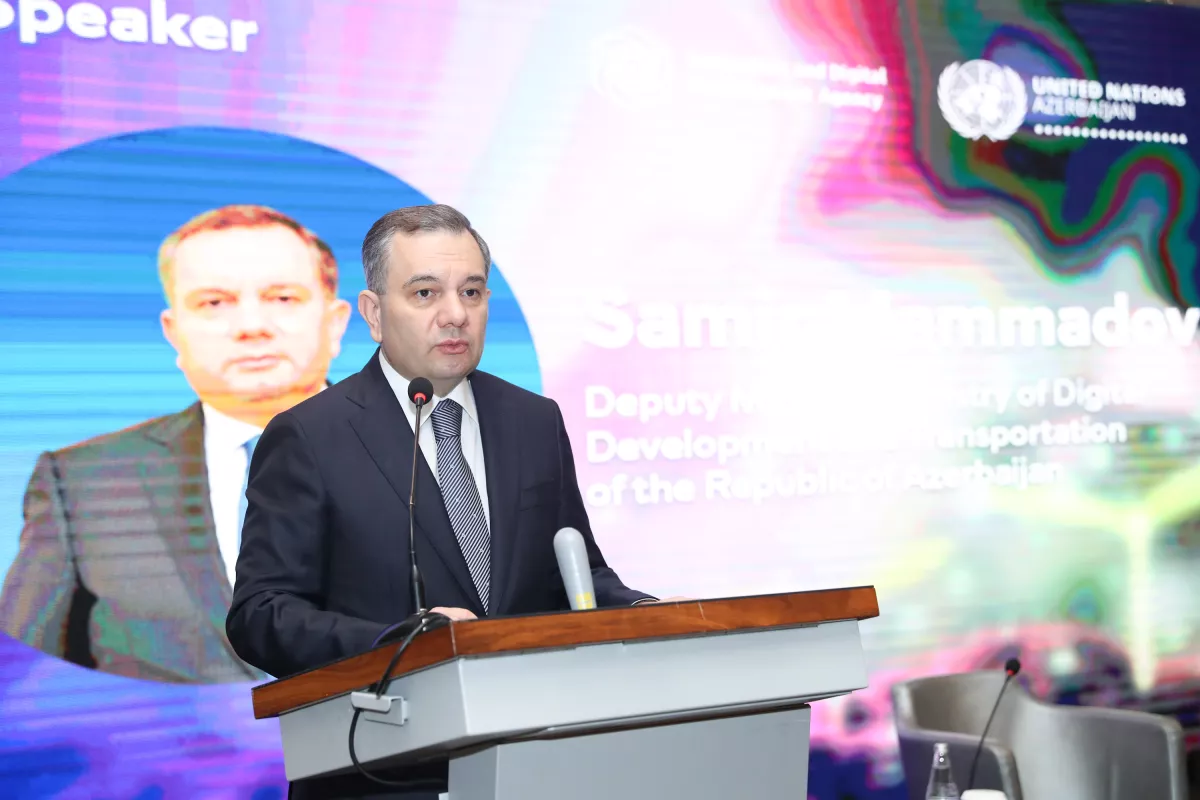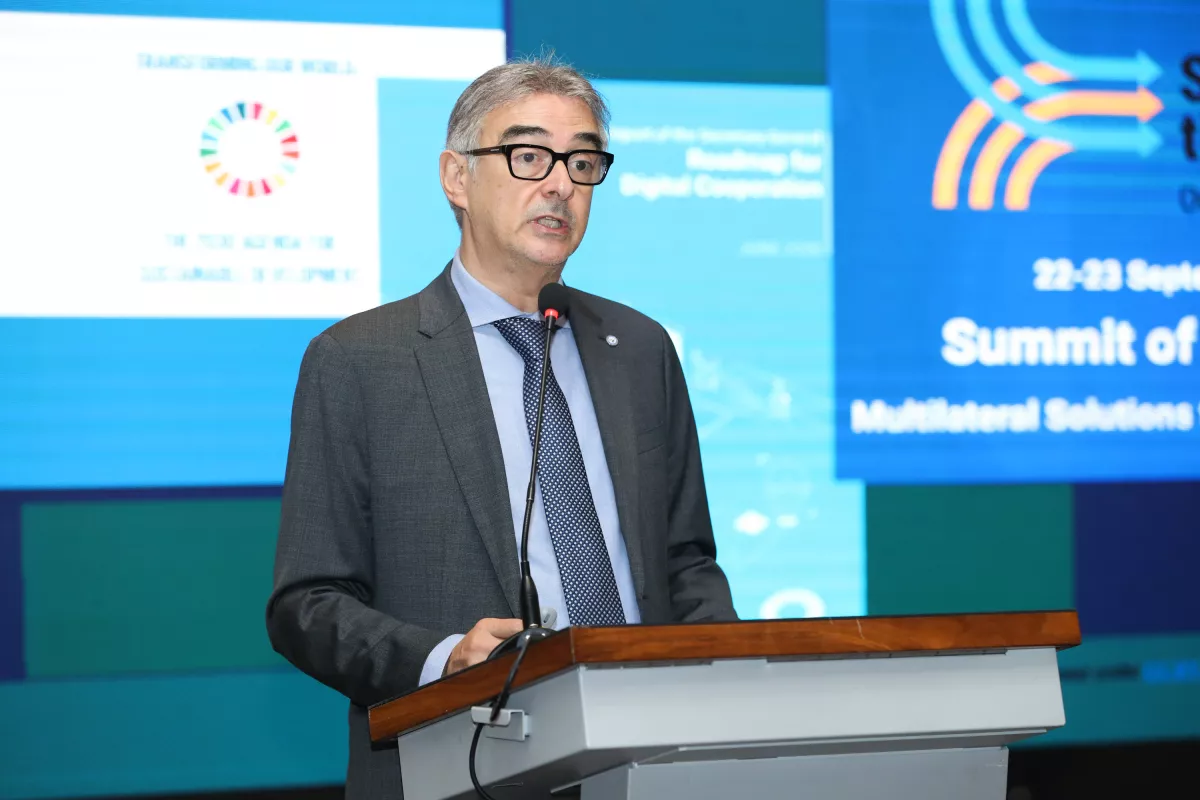Two decades of E-Azerbaijan: A look at the digital transformation journey Pioneering a paperless future
Twenty years ago, Azerbaijan embarked on a pivotal journey by launching the "Electronic Azerbaijan" state programme, aimed at integrating the country into the global information society. This long-term digital transformation has led to the creation of an advanced e-government system. Today, Azerbaijan’s single e-government portal serves as the backbone of state administration and the primary hub for providing electronic public services to its citizens. These achievements, along with the future of Azerbaijan’s digitalisation efforts, were the focal points of the international forum, "Paperless Government: Impact of Digitalisation and Innovation on the Environment," held recently in Baku as part of the "29 Climate Talks: the Path to COP29" initiative.
The e-Government Development Centre, operational under the State Agency for Citizen Services and Innovations since 2018, oversees a system that delivers contactless public services and information to citizens, businesses, and government agencies. One of the standout benefits of this platform is the enhanced ability for civil oversight of government operations, helping to reduce bureaucratic delays and increase transparency. This progress also significantly aids in combating corruption by ensuring greater accountability within both commercial and public sectors.
Azerbaijan's e-government system has garnered recognition from reputable international bodies, including the United Nations, which has highlighted its achievements in various E-Government Surveys. The country consistently ranks high in the post-Soviet space on the "E-Government Development Index" and the "E-Participation Index," underlining its commitment to digital governance.
Currently, over 500 electronic services from various ministries and state agencies are available through Azerbaijan's unified e-government portal (www.e-gov.az). The number of registered users on the eGOV portal and the innovative myGOV platform has surged significantly in recent years. Services related to public utilities, housing privatisation, fiscal and customs sectors, public procurement, labour relations, and entrepreneurship are particularly popular, especially within the business community. It’s worth noting that more than 1,000 companies are now connected to Azerbaijan's digital document management system, which processes over 500,000 documents monthly.
At the recent forum "Paperless Government: The Impact of Digitalisation and Innovation on the Environment," Rashad Khalygov, Deputy Chairman of the Innovation and Digital Development Agency (IRIA), announced that approximately 500 public services have been digitized on Azerbaijan's National e-Government Platform. In addition, various state information systems are operational across sectors such as social services, customs, ecology, and agriculture.
Khalygov also highlighted the country’s existing digital infrastructure, which includes the Government Cloud (G-cloud), National Data Centre, and electronic and biometric signature systems. Through these, citizens can access information from different government agencies using an e-signature. This year saw the completion of a project designed to streamline digital information and document exchange between government entities, now extended to include the judiciary.
In a significant move towards innovation, Khalygov revealed plans to integrate artificial intelligence (AI) mechanisms into the myGOV portal by the end of 2024. This upgrade will enable citizens to communicate with the government via text or voice messages, which AI will process for more efficient interactions.

Deputy Minister of Digital Development and Transport, Samir Mammadov, added that Azerbaijan aims to equip 65% of its population with digital skills. By the end of 2026, around one million citizens are expected to use digital identity cards, reflecting the country’s continued strides toward a fully digitized future.
As a reminder, according to global standards, a digital identity card (mobiil-ID) functions as a mobile electronic document linked to a SIM card, accessible on smart devices. It allows users to verify their identity in the digital environment and provide digital signatures. With mobiil-ID, individuals can perform tasks equivalent to using a physical ID, such as accessing e-services portals, conducting banking transactions, signing digital documents, entering state registries, and even voting.
Meanwhile, IRIA experts are working to assess the digitalisation needs of Azerbaijan to ensure that electronic services are aligned with the actual demands of the population. Khalygov shared that, "it is planned to bring the level of digitalisation of public services in Azerbaijan to 80% by 2026." He also reflected on the progress made: "We started this work in 2011, launching the e-Government Platform, and gradually digitising various state systems."
However, Khaligov noted a current challenge—some digital platforms are too complex for the average citizen, stating, "sometimes excessive digitalisation is not a good solution." The agency is working to consolidate certain services to make them more accessible to the public.
While simplifying and streamlining these mechanisms remains a significant task, ensuring the security of sensitive digital information is equally important. Protecting these platforms from cyber threats is crucial.

"It is necessary to develop data recovery plans considering the risks posed by digital transformation, particularly those related to information security," warned Vincenzo Acuaro, Head of Digital Government at the UN Department of Economic and Social Affairs (UN DESA). He also highlighted other risks, such as system failures, adding, "Here we are also talking about the possibility of data loss, so it is imperative to work on data recovery mechanisms."
In recent years, the State Service for Special Communication and Information Security, along with other relevant agencies in Azerbaijan, has implemented extensive measures to ensure the cybersecurity of state information resources, government portals, and the overall e-government system. A key approach to achieving these objectives is the expansion of DATA-centre capacities and the creation of a secure G-cloud system. This initiative has led to the development of a stable and sustainable IT infrastructure, with high-quality service provision, operational coordination, and 24/7 monitoring by AzInTelecom specialists.
Notably, the migration of state institutions' information systems and resources to DATA-centres in Baku, along with backup DATA centres in Yevlakh, is nearing completion. These centres meet the international Uptime Institute TIER III standard, ensuring reliable and secure data management for state entities.
The forum "Paperless Government: The Impact of Digitalisation and Innovation on the Environment," underscored the significant environmental benefits of adopting e-services and widespread digital document management in both public and private sectors. UN Resident Coordinator in Azerbaijan, Vladanka Andreeva, highlighted the detrimental environmental effects of paper use, including deforestation and greenhouse gas emissions.
"Imagine how many trees will be saved with a complete transition to digital documentation in Azerbaijan," Andreeva remarked, adding that a paperless government not only protects forests but also conserves resources, reducing carbon emissions and fostering a culture of responsible consumption.
IRIA Deputy Chairman, Rashad Khalygov, echoed these sentiments, emphasizing the "green" impact of nationwide digitalisation: "Thanks to the digital format, we can save about 2,000 trees annually in Azerbaijan, and it is important to continue this work within the framework of the Digital Strategy."








